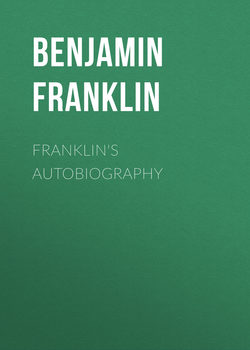Franklin's Autobiography

Реклама. ООО «ЛитРес», ИНН: 7719571260.
Оглавление
Бенджамин Франклин. Franklin's Autobiography
INTRODUCTION
§ 1. PARENTAGE AND BOYHOOD
§ 2. SEEKS HIS FORTUNE
§ 3. FIRST VISIT TO LONDON
§ 4. IN PHILADELPHIA AND IN BUSINESS FOR HIMSELF
§ 5. CONTINUED SELF-EDUCATION
§ 6. ENTERS PUBLIC LIFE
§ 7. PROJECTS FOR THE PUBLIC GOOD
§ 8. FRANKLIN ACTS IN CONCERT WITH BRADDOCK'S ARMY. ORGANIZATION OF MILITIA
§ 9. THE PHILADELPHIA EXPERIMENTS
§ 10. MISSION TO ENGLAND
LETTERS REFERRED TO ON PAGE 89. From Mr. Abel James (Received in Paris)
THE WAY TO WEALTH,
PROVERBS FROM POOR RICHARD'S ALMANAC
NOTES AND SUGGESTIONS
ECLECTIC ENGLISH CLASSICS
Отрывок из книги
Dear Son: 5 I have ever had pleasure in obtaining any little anecdotes of my ancestors. You may remember the inquiries I made among the remains of my relations when you were with me in England, and the journey I undertook for that purpose. Imagining it may be equally agreeable to you to know the circumstances of my life, many of which you are yet unacquainted with, and expecting the enjoyment of a week's uninterrupted leisure in my present country retirement, I sit down to write them for you. To which I have besides some other inducements. Having emerged from the poverty and obscurity in which I was born and bred, to a state of affluence and some degree of reputation in the world, and having gone so far through life with a considerable share of felicity, the conducing means I made use of, which with the blessing of God so well succeeded, my posterity may like to know, as they may find some of them suitable to their own situations, and therefore fit to be imitated.
That felicity, when I reflected on it, has induced me sometimes to say that, were it offered to my choice, I should have no objection to a repetition of the same life from its beginning, only asking the advantages authors have in a second edition to correct some faults of the first. So I might, besides correcting the faults, change some sinister accidents and events of it for others more favorable. But though this were denied, I should still accept the offer. Since such a repetition is not to be expected, the next thing like living one's life over again seems to be a recollection of that life, and to make that recollection as durable as possible by putting it down in writing.
.....
There was another bookish lad in the town, John Collins by name, with whom I was intimately acquainted. We sometimes disputed, and very fond we were of argument and very desirous of confuting each other; which disputatious turn, by the way, is apt to become a very bad habit, [n] making people often extremely disagreeable in company by the contradiction that is necessary to bring it into practice; and thence, besides souring and spoiling the conversation, is productive of disgusts and perhaps enmities where you may have occasion for friendship. I had caught it by reading my father's books of dispute about religion. Persons of good sense, I have since observed, seldom fall into it, except lawyers, university men, and men of all sorts that have been bred at Edinburgh.
About this time I met with an odd volume of the "Spectator." 29 It was the third. I had never before seen any of them. I bought it, read it over and over, and was much delighted with it. I thought the writing excellent, and wished, if possible, to imitate it. With this view, I took some of the papers, and, making short hints of the sentiment in each sentence, laid them by a few days, and then, without looking at the book, tried to complete the papers again, by expressing each hinted sentiment at length, and as fully as it had been expressed before, in any suitable words that should come to hand. Then I compared my "Spectator" with the original, discovered some of my faults, and corrected them. But I found I wanted a stock of words, or a readiness in recollecting and using them, which I thought I should have acquired before that time if I had gone on making verses; since the continual occasion for words of the same import, but of different length to suit the measure, or of different sound for the rhyme, would have laid me under a constant necessity of searching for variety, and also have tended to fix that variety in my mind and make me master of it. Therefore I took some of the tales and turned them into verse; and, after a time, when I had pretty well forgotten the prose, turned them back again. I also sometimes jumbled my collections of hints into confusion, and after some weeks endeavored to reduce them into the best order before I began to form the full sentences and complete the paper. This was to teach me method in the arrangement of thoughts. By comparing my work afterward with the original, I discovered many faults and amended them; but I sometimes had the pleasure of fancying that in certain particulars of small import I had been lucky enough to improve the method or the language, and this encouraged me to think I might possibly in time come to be a tolerable English writer, of which I was extremely ambitious. My time for these exercises and for reading was at night after work, or before it began in the morning, or on Sundays, when I contrived to be in the printing house alone, evading as much as I could the common attendance on public worship, which my father used to exact of me when I was under his care, and which indeed I still thought a duty, though I could not, as it seemed to me, afford time to practice it.
.....